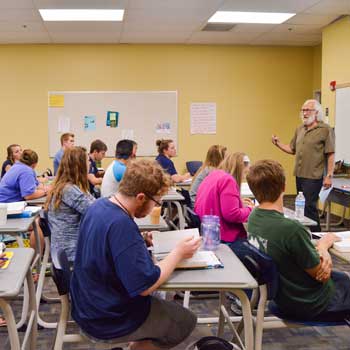Story by Abby Siegel, Contributing writer

Robert Long addresses his class of nonprofit leadership students.
Murray State’s Nonprofit Leadership Studies program continues to develop with the newest addition of a master’s program that launched Aug. 18.
Since its establishment 32 years ago, the program has experienced much growth, expanding from a minor into a major in 2011 and undergoing a name change in 2014. To date, the program has a major, minor, concentration, certificate and master’s opportunity.
The reason for growth is because of the “continuing evolution” of the nonprofit sector, with the changes made in the program being “driven by demand,” said Robert Long, Distinguished Visiting Professor.
“I think the secret to our success will be significantly grounded in the quality of scholarship and real world experience,” Long said.
He said professors in the new master’s program teach material that is relevant, as many have recent experience within the field. Courses can be taken entirely online, in person or as a combination in an effort to include current professionals in the field who are pursing higher education.
Courses on financial development, advocacy, policy and leadership development are included in the core requirements.
In addition to the focus on core competencies, the program also requires a little more work from students. They must give an analysis of trends and ideas as well as develop an understanding of the historical and moral roots of nonprofit leadership in society to prepare students to be the future leaders, said David Whaley, dean of the College of Education and Human Services.
The curriculum was planned through the supportive guidelines of the Nonprofit Academic Centers Council and a Nonprofit Leadership Studies advisory committee that is comprised of regional nonprofit professionals, key University faculty, alumni and students.
The committee provided feedback and advice from professionals about direction for the program.
“I like how we do service hours and work alongside local nonprofits to better learn the objectives taught in class,” Miranda Bivins, senior from Cerulean, said.
Bivins will graduate this December and has applied for the Master of Science in Nonprofit Leadership Studies program.
A distinguishing aspect of the program is the emphasis on leadership rather than management, said Peter Weber, director of Nonprofit Leadership Studies.
“We believe that it is important for all citizens,” Weber said. “To be good in service you need to know ethical expectations.”
Most programs in the nonprofit sector are located in large metropolitan areas and aren’t commonly found in rural areas like Murray. The “deeply integrated” connection the program has to the community is “exceptional,” Weber said.
Many of the courses require students to work alongside local nonprofits, allowing them to develop their expertise while supporting the work of the organization.
“It supports capacity building of local and regional nonprofit organizations by developing both the expertise and the leadership skills of nonprofit professionals,” Whaley said.
The timing of the program was a factor that attracted Bivins to the program.
“Since the master’s program just happened to begin so close to my undergraduate graduation I felt like that was God’s plan for me,” she said.
The program is defying common stereotypes and myths about the nonprofit sector. According to idealist.org, 10 percent of people in the United States are employed by a nonprofit, and about 1.5 million nonprofit organizations are registered in the United States alone.
“People don’t realize that working in the nonprofit sector can be a profession,” Weber said. “Convincing the broader audience that this program is serious and important is one of the major challenges.”
Bivins, however, is convinced that this is the field for her. Her career goal is to work with children from the developing world and she said this program will adequately prepare her for the future.
“It’s an area where passion matters more than dollars, where we strive to make the world a better place and are willing to sacrifice for it,” she said. “It’s such a rewarding field in all aspects.”